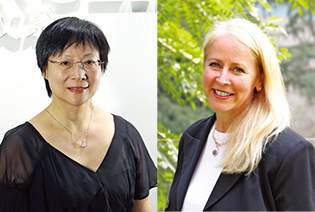
A series of PolyU studies has explored people's communication behaviour in the virtual world.
Communication in the virtual world, whether when shopping online, asking for customer service support or attending team meetings, is now a daily phenomenon, affecting communication behaviour and lifestyles.
Prof. Winnie Cheng and Dr Gail Forey at PolyU's Department of English have partnered with Dr Jane Lockwood at City University of Hong Kong to study how communicating via the phone and computer across national boundaries impacts customer care, intercultural meanings, training, quality assurance, staff assessment and globalisation. For over 10 years they have studied what this emerging discourse looks like, with specific reference to call centre messages, online and SMS chat interactions and virtual team meetings.
The initial research started with customer calls to a range of commercial enterprises. Calling from places such as the UK, USA or Australia for assistance, customers would generally be linked to customer service representatives in the Philippines or India. The study analysed the language and causes of communication breakdown, finding that grammar and accent were not dominant issues. They explored how customer care is carried out in different cultures, how to deal with frustrated and angry customers and how training and assessment should reflect authentic call centre interaction. The findings were shared with industry to enhance communication, intercultural meaning and training.
The research team has also examined the developing discourse features of virtual team meetings and online chats. The meetings of six project teams involving onshore and offshore colleagues working collaboratively were recorded, transcribed and analysed. In a case involving an IT project team comprising Australia-wide and Indian membership, the Australian manager dominated the talk and controlled the turn-taking for conversations. He used direct statements that often contracted options for others to respond and closed down interaction. Research also found that onshore managers frequently used metaphorical language and idiomatic expressions, which increased the complexity of meaning. Such findings could inform training or coaching solutions to enhance collaborative and inclusive virtual team meetings.
The findings from the research have been published in nearly 30 academic articles and book chapters. ♦

